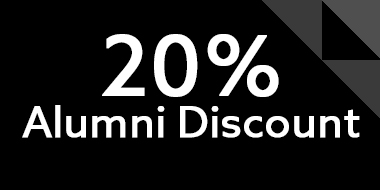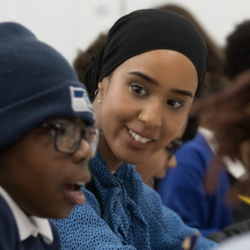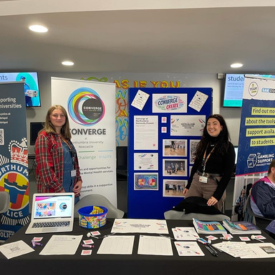 Tim Brown Tim Brown
Chief Executive of IDEO;
We had the honour of presenting our recent project to Tim and engage with him in a conversation about innovation. He emphasised the importance of collecting evidence to confirm our assumptions and using prototypes in the initial research phase to accelerate learning. Although design follows the same principles as science (hypothesis-experiment-evidence), Tim defined science as ‘the truth’ and design as ‘the choice’. A tip from Tim was to run ideation sessions or workshops from midday to midday, to allow ‘reflectors’ to have thinking time overnight. We are already putting his advice into practice, in order to accelerate our learning and better understand those we are designing for and with.
|
 Sir Jonathan Ive Sir Jonathan Ive
Head of Global Design at Apple;
Sir Jonny told us that in order to fully create disruptive innovation and fundamentally change the attitude of the masses it is important to think differently. He gave us some stories around how he has achieved this in the past and told us to continue on the road we were doing and the results would come.
|
Gavin Proctor
Director Design Innovation at Philips Consumer Lifestyle;
We engaged in an interesting and inspiring discussion with Gavin after we presented to him some of our work. From his experience working in Taiwan, Gavin advised us to consider the importance of culture and how it can influence how we think, feel and behave. We have already begun to consider different cultural perspectives and their ways of working within our cohort and will continue to gain insight through our Hong Kong Polytechnic University exchange student, Raymond, as well as our international students from South Korea and Japan. Later in the day, Gavin told us about how Philips are involved in design for medical healthcare, empowering individuals by designing solutions that are no longer just ‘products’. He mentioned the biggest challenge for Philips comes from within, as design tools and methods continue to spread throughout the company. As opposed to the traditional method of producing a final outcome, Gavin emphasised that by applying skills and making ideas tangible from the start, design can be involved in the entire project process.
|
Sue Wilson
Director of Wood for the Trees;
Sue Wilson is director of Wood for the Trees, and is former Global Head of Design for Mars. During our question and answer session, we were discussing how we could change co rperate thinking. She told us that she believes the only way that companies will change their philosophy would be to incentivise the change towards the circular economy.
|
Mark Delaney
Futurist at Microsoft Nokia;
Mark came in to MDI to see our presentation on the circular economy. As a renowned macro‐scale thinker he told us to think about working on the outer edges but aim for inner edges. He said that this outside-in thinking would help us to consider all the stakeholders involved in our projects and innovate beyond incremental change.
|
Paul Howells
Head of Packaging Design at Unilever;
Paul came to MDI for our presentation around circular economy. Paul told us that in order for the circular economy to be achievable large FMCGs need to be able to retain or add value to the individual components and materials; this will encourage reuse as the material still has enough value to be worthwhile.
|
Glyn Ingram
Deputy Director, Campus Services at Northumbria University;
Glyn was concerned with the level of engagement between Northumbria Catering and the student body it serves. Glyn was unsure how to connect with the students effectively, to allow the service to be exciting, dynamic and responsive to their needs. We tackled a two week challenge: how can Northumbria Catering deliver improved experiences, value for money and support the collective passion for food? From this project, we learnt the importance of experiencing the position of the end user, talking to people to generate insight and the power of visualisation and prototypes.
|
Anne Blackie
Manager at Creche Mobile;
Anne arrived to Northern Design Centre on a double dekker bus and briefed us on the background of Creche Mobile. She explained that at the centre of Creche mobile business model was the bus which traveled to venues across the North of England and provided education-led children care for children of all age groups. Anne was interested in exploring new business opportunities and markets (such as weddings and outdoor events). We learnt about the challenges of running and supporting a charitable company and its transition to a micro-enterprise. We saw the impact that our work has on an organisation: consolidating the brand values and implementing these through refreshed communications aimed at new and novel market opportunities.
|
John Mortimer
Commerical Manager at BeMordern;
We collaborated with regional furniture company BeModern; who specialize in bathroom suites and high-quality fire surrounds. John’s brief challenged us to consider the companies business’ development, their current market position, expertise and ambitions for the future. We considered where within homeware BeModern could have the most impact and how they could utilize their resources and expertise to lead the market. We developed a coherent brand and new product and service innovations which were critiqued by John throughout the project process. We learnt the importance of responding to client feedback to develop a package of work to meet the client needs and to drive forward innovation in the furniture market.
|
Nicola Parkhouse
Entreprenuer, Tribe Bike Racks;
Nicola Parkhouse had searched the web in her frustration to find an easy-to-use bike rack for her family. This search eventually led her to connect with a mechanical engineering duo in the States and their innovative bike rack. A year later, Nicola has managed to gain the UK/EU patent and sole rights to this product in Europe. However, her main challenge is to establish a brand position ready for launch, based on the ease of use and support service offer. We had one week to bring Nicola’s ambition to life through strategy leveraging product refinements, product line extension, key brand values, appropriate marketing and communications plans. Being challenged by Jessica Cornwell (a manufacturing consultant working with Nicola) in the final presentation, we were made aware of the importance of nailing the fine details, aligning costs, design decisions and marketing plans.
|
Phil Sams and Elaine Colquhoun
Elaine, Executive Principal of Whitefield school;
Phil, Visiting Professor of Northumbria University;
Elaine and Phil presented us with a two week challenge working with Whitefield school; who specialise in finding employment opportunities for individuals with disabilities and supporting their integration into society. Elaine challenged us to develop radical concepts to enhance the student journey both within and beyond the gates of Whitefield. We also explored the possibility of expansion across the UK and Europe.
We learnt that this project was not just about finding jobs for students, as Elaine’s passion highlighted the importance of applying innovation towards improving people’s lives. This was a rewarding project and we gained an insight into how to connect with and reduce the distance between ourselves and those we are designing for.
|
Fernando Rojas
Doctoral candidate at Northumbria University and design academic teaching in Puerto Rico;
Fernando set us a brief: create a mindfulness device utilising dynamic stakeholder mapping and reciprocal perspectives. We presented our various stakeholder tools and welcomed his opinions and feedback. Fernando taught us that the purpose of considering stakeholders in the project process is to increase our awareness of how decisions affect others and how they can collaborate to deliver an outcome. He explained that reciprocal perspectives appear to be contrasting, yet are simply different perspectives on the same situation. We have learnt that by bringing together and considering all stakeholders, we can hold a more complete view of a system. He posed the question: how would it be used; how would it be valuable to the project process? We have already started to apply the stakeholder maps within our current project and hope that as our understanding increases over time, we can develop a dynamic tool to be shared with others. We hope that by being mindful of the stakeholders involved, this tool will increase our awareness and help to guide how decisions are made throughout a project.
|
Roy Sandbach
Former Director of Research and Design at Proctor and Gamble;
Professor Roy Sandbach came into MDI for our presentation around the circular economy and how design can help engage the disinterested. He gave us invaluable advice around creating detailed customer profiling to ensure that every problem or decision was correct for their customer. He also explained that the customer should be at the heart of every design project undertaken, and if the customer wouldn’t like it then there is no point in the innovation.
|
Alexandra Tyrer
Project Manager at McLaren Applied Technologies;
Alexandra told us that innovation moving forward needs to be much more focused around personalised services and co‐creation. By utilising co‐creation effectively we can ensure that innovations are much closer aligned to our stakeholders wants and needs therefore improving our chances of success.
|
Colin Webster
Ellen McArthur Foundation;
Colin Webster held a workshop in partnership with the ‘disruptive innovation festival’ which introduced us to the idea of a circular economy. We were made aware of the current issues within the linear system (buy-use-dispose) and were challenged in teams to come up with a creative alternative. We explored innovative solutions to overcome the challenge of ‘zero waste’ and the workshop helped us to consider how design can be used as a tool to facilitate engagement. We later applied this knowledge to our project ‘Design for the Disinterested’.
|


 Tim Brown
Tim Brown Sir Jonathan Ive
Sir Jonathan Ive











